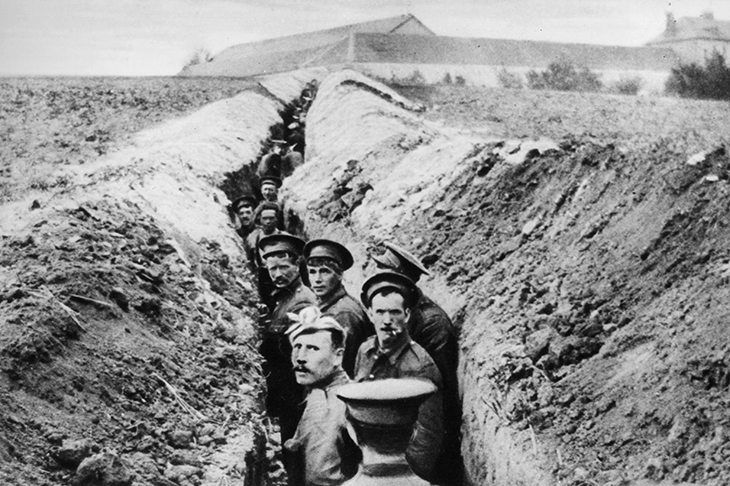My reactionary first world war reading jag continues. The literature is vast, but so is my capacity and fascination. I began reading systematically, then went in search of thrills. Typing ‘my top ten first world war books’ into a search engine has also been a wonderfully fruitful source of leads. Space, and probably your boredom threshold, won’t allow me to list mine. I want to stick my neck out, however, and give a cheer for two books by liaison officers: one a Anglophile Frenchman liaising with the British, the other a Francophile Englishman liaising with the French. As one might imagine, both books are tragicomic.
Emile Herzog was the son of a textile tycoon. In the first world war he served as an interpreter, then as a liaison officer. The Silence of Colonel Bramble is a series of fictional sketches set in a British officer’s mess near Ypres. The principal characters are the eponymous and taciturn Colonel, a major, a regimental doctor, a veterinary officer, a padre and a French liaison officer. The sketches consist mainly of dialogue. The well-educated characters discuss political philosophy, mathematics, nature, war, religion and other such weighty topics, but always return to the subject of national character. (‘It’s the Hun’s fault,’ said the Colonel sadly, ‘that war is no longer a gentleman’s game.’ ‘We never imagined that such cads existed,’ said the Major.) The characters stand out as sharply as the Walmington-on-Sea platoon, and the conversation, though generally more profound, is as funny. Herzog wrote under the pseudonym of André Maurois. First published in French, the book was a huge a success, launching Herzog’s writing career.
Lieutenant Edward Spears liaised between the French Fifth Army under General Lanrezac and the British Expeditionary Force under General Sir John French. He was the first British soldier to arrive in France. His book Liaison 1914 is a day-by-day account of his work between 5 August and 14 September. Spears is the embodiment of the British soldier’s Roman ideal. According to Spears’s account, General Lanrezac, as a man, is an English music-hall comedian’s idea of a Frenchman: sulky, bombastic, grandiose, treacherous. As a general he alternates between insane courage and pusillanimity. Conversely, General Sir John French is a French music-hall comedian’s idea of an Englishman: bluff, blinkered, witless, unreliable. As a soldier Sir John alternates between hallucinatory optimism and panic. Spears is these two gentlemen’s go-between.
A meeting is arranged. Sir John tries to speak French. By an unfortunate coincidence, he tries to pronounce the word ‘Huy’ — the name of a village and strategic river crossing. It is Spears’s opinion that ‘Huy is one of the most difficult [French] words imaginable to pronounce, the “u” having practically to be whistled.’ Lanrezac, who speaks not a word of English, and hates Sir John on sight, is frankly rude.
Later, during the great retreat from Mons, Spears’s difficulties in reconciling the respective generals’ movements are compounded by Sir John’s inexplicable absences from his own headquarters. Lanrezac’s opinions of the British Expeditionary Force become so abusive that Spears threatens to resign unless he receives an apology. Incredibly, he gets a decent one. Meanwhile the French continue to attack the invaders without counting the cost, a third of a million Frenchmen are killed in a single month and the French armies are pressed back almost to Paris. Spears’s 500-page memoir reads like a page-turner of a novel.
The day after I’d finished Liaison 1914, I checked the listings to see if there was anything worth watching at the local cinemas. They Shall Not Grow Old, Peter Jackson’s colourised Imperial War Museum first world war archive film compilation was showing at the local arts centre for one night only — starting in half an hour. I’d booked a ticket three weeks earlier after reading a preview in a newspaper but forgotten all about it. I rushed to the cinema and took my front-row seat a minute before the film started.
Perhaps you have read one of the reviews that appeared in the papers the next day. The adjective ‘staggering’ was used in several of them. It was. It has been my experience that the more one reads the literature and history of the first world war, the greater the sense of distance and alienation one feels from the generation that fought in it. But when, half an hour into the film, the screen broadened, black-and-white turned to colour, and the young soldiers’ faces vying for the camera’s attention actually spoke, the thrill of recognition was so electrifying that I couldn’t take in all I was seeing. And how we laughed at their jokes! Their humour was exactly the same as ours! Our little auditorium rocked with surprised laughter. They had become us instead of them, only with rotten teeth. Or am I deceiving myself?







Comments